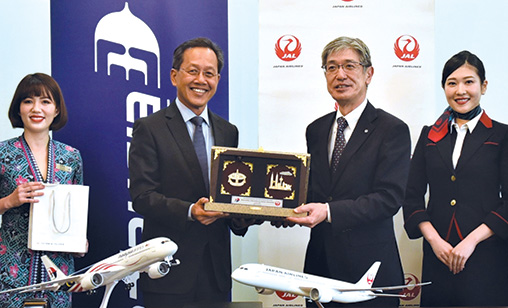Addendum
Malaysia Airlines CEO submits rescue plan to government owners
June 1st 2019
The coming few weeks will be critical to the fate of Malaysia Airlines Berhad (MAB) as its owner, sovereign wealth fund Kazannah Nasional Berhad, considers a rescue plan for the carrier. Read More »
“I have this last 100-metre dash to stabilize this organization, to create future leaders, to make people in the organization embrace the culture of change,” the airline group CEO, Izham Ismail, told the South China Morning Post at an airline industry gathering in Seoul last month.
 |
Earlier this year, Malaysia’s prime minister, Mahatir Mohamad, said the government must decide if the carrier has a future. It has been widely reported that Kazannah Nasional will consider Izham’s turnaround plan in the next four weeks and rule on a shutdown, a sale or a refinancing of the carrier.
In the meantime, the Kuala Lumpur-headquartered carrier has found a new industry friend. In late May, Japan Airlines (JAL) and MAB signed a Memorandum of Understanding for joint venture Malaysia-Japan services. A few weeks later, the Japanese airline group said it would like to extend the proposed joint venture to MAB’s services to the U.S. and some Asian routes.
“We believe what Malaysia Airlines is going through right now is similar to what Japan Airlines went through and we recovered from that situation,” JAL president, Yuji Akasaka, told Reuters on the sidelines of the annual International Air Transport Association AGM early in June.
JAL entered bankruptcy protection in 2010 and emerged five years later as a leaner carrier, but without the status of being Japan’s biggest carrier. All Nippon Airways has overtaken JAL to become the country’s largest airline.
Akasaka, who will accept delivery of JAL’s first A350 this month, said if the relevant authorities approved the joint venture, MAB would benefit from the large number of Japan-U.S. services in JAL’s network. He also indicated JAL would consider an equity investment in MAB.
Separately, MAB’s Izham told the South China Morning Post the carrier’s survival plan was based on the airline remaining a full-service operator that could win market share from competing LCCs with its superior product.
He said he wanted to attract business partners to MAB that understood the challenges MAB faces to survive and transform the culture of the carrier.
JAL and MAB could collaborate on cargo, ground handling and knowledge transfer, Izham told the Hong Kong news platform, and added future MAB partners would not necessarily have to be drawn from its oneworld alliance partners or the airline industry in general.